
Presidential elections were held in the United States on November 7, 1876. Republican Governor Rutherford B. Hayes of Ohio very narrowly defeated Democrat Governor Samuel J. Tilden of New York. Following President Ulysses S. Grant's decision to retire after his second term, U.S. Representative James G. Blaine emerged as frontrunner for the Republican nomination; however, Blaine was unable to win a majority at the 1876 Republican National Convention, which settled on Hayes as a compromise candidate. The 1876 Democratic National Convention nominated Tilden on the second ballot.

Presidential elections were held in the United States on November 5, 1872. Incumbent President Ulysses S. Grant, the Republican nominee, defeated Democratic-endorsed Liberal Republican nominee Horace Greeley.
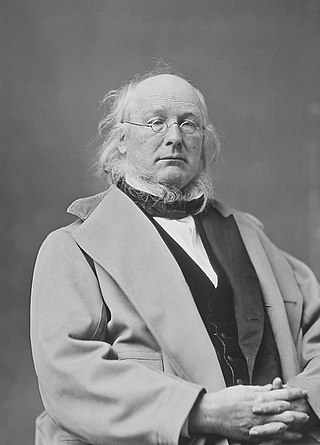
Horace Greeley was an American newspaper editor and publisher who was the founder and editor of the New-York Tribune. Long active in politics, he served briefly as a congressman from New York and was the unsuccessful candidate of the new Liberal Republican Party in the 1872 presidential election against incumbent President Ulysses S. Grant, who won by a landslide.
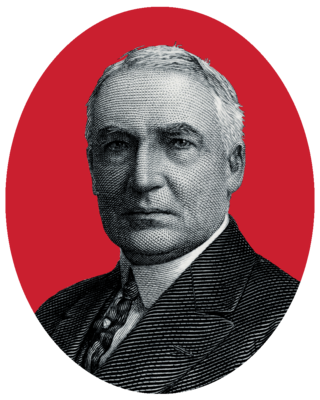
The 1920 Republican National Convention nominated Ohio Senator Warren G. Harding for president and Massachusetts Governor Calvin Coolidge for vice president. The convention was held in Chicago, Illinois, at the Chicago Coliseum from June 8 to June 12, 1920, with 940 delegates. Under convention rules, a majority plus one, or at least 471 of the 940 delegates, was necessary for a nomination.
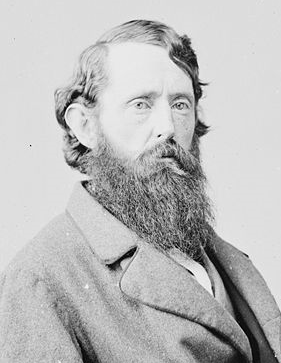
Benjamin Gratz Brown was an American politician. He was a U.S. Senator, the 20th Governor of Missouri, and the Liberal Republican and Democratic Party vice presidential candidate in the presidential election of 1872.
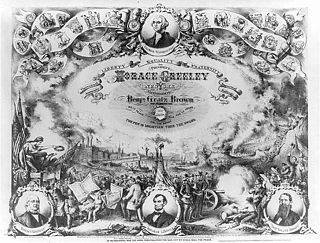
The Liberal Republican Party was an American political party that was organized in May 1872 to oppose the reelection of President Ulysses S. Grant and his Radical Republican supporters in the presidential election of 1872. The party emerged in Missouri under the leadership of Senator Carl Schurz and soon attracted other opponents of Grant; Liberal Republicans decried the scandals of the Grant administration and sought civil service reform. The party opposed Grant's Reconstruction policies, particularly the Enforcement Acts. It lost in a landslide, and disappeared from the national stage after the 1872 election.

The 1860 Republican National Convention was a presidential nominating convention that met May 16–18 in Chicago, Illinois. It was held to nominate the Republican Party's candidates for president and vice president in the 1860 election. The convention selected former representative Abraham Lincoln of Illinois for president and Senator Hannibal Hamlin of Maine for vice president.

The 1856 Republican National Convention was a presidential nominating convention that met from June 17 to June 19, 1856, at Musical Fund Hall at 808 Locust Street in Philadelphia, Pennsylvania. It was the first national nominating convention of the Republican Party, founded two years earlier in 1854. It was held to nominate the party's candidates for president and vice president in the 1856 election. The convention selected John C. Frémont, a former United States Senator from California, for president, and former Senator William L. Dayton of New Jersey for vice president. The convention also appointed members of the newly established Republican National Committee.
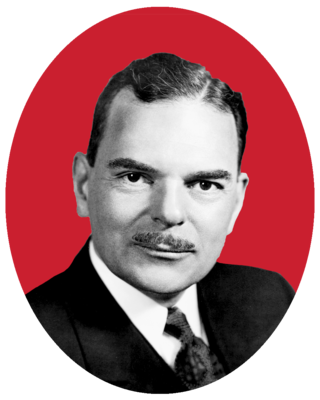
The 1944 Republican National Convention was held in Chicago, Illinois, from June 26 to 28, 1944. It nominated Governor Thomas E. Dewey of New York for president and Governor John Bricker of Ohio for vice president.
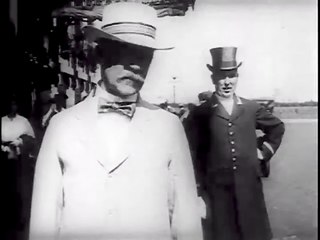
The 1916 Republican National Convention was held in Chicago from June 7 to June 10. A major goal of the party's bosses at the convention was to heal the bitter split within the party that had occurred in the 1912 presidential campaign. In that year, Theodore Roosevelt bolted the GOP and formed his own political party, the Progressive Party, which contained most of the GOP's liberals. William Howard Taft, the incumbent president, won the nomination of the regular Republican Party. This split in the GOP ranks divided the Republican vote and led to the election of Democrat Woodrow Wilson.

The 1872 Republican National Convention was held in Philadelphia, Pennsylvania, June 5–6, 1872. President Ulysses S. Grant was unanimously nominated for reelection by the convention's 752 delegates. Massachusetts Senator Henry Wilson replaced sitting Vice President Schuyler Colfax as the Republican vice presidential nominee.
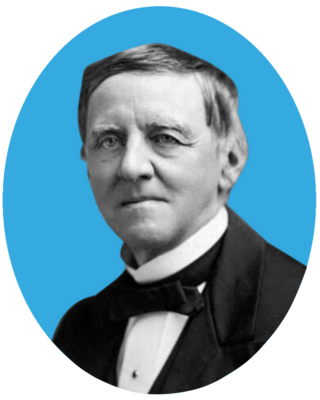
The 1876 Democratic National Convention assembled in St. Louis just nine days after the conclusion of the Republican National Convention in Cincinnati.

The 1872 Democratic National Convention was a presidential nominating convention held at Ford's Grand Opera House on East Fayette Street, between North Howard and North Eutaw Streets, in Baltimore, Maryland on July 9 and 10, 1872. It resulted in the nomination of newspaper publisher Horace Greeley of New York and Governor Benjamin Gratz Brown of Missouri for president and vice president, a ticket previously nominated by the rump Liberal Republican faction convention meeting, also held in Baltimore's newly built premier Opera House of nationally well-known theatre owner/operator John T. Ford of the major Republican Party, which had already re-nominated incumbent President Ulysses S. Grant of the regular Republicans for another term.
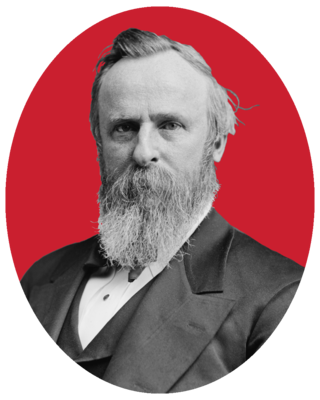
The 1876 Republican National Convention was a presidential nominating convention held at the Exposition Hall in Cincinnati, Ohio on June 14–16, 1876. President Ulysses S. Grant had considered seeking a third term, but with various scandals, a poor economy and heavy Democratic gains in the House of Representatives that led many Republicans to repudiate him, he declined to run. The convention resulted in the nomination of Governor Rutherford B. Hayes of Ohio for president and Representative William A. Wheeler of New York for vice president.
The 1884 Democratic National Convention was held July 8–11, 1884 and chose Governor Grover Cleveland of New York their presidential nominee with the former Governor Thomas A. Hendricks of Indiana as the vice presidential nominee.

The 1864 National Union National Convention was the United States presidential nominating convention of the National Union Party, which was a name adopted by the main faction of the Republican Party in a coalition with many, if not most, War Democrats after some Republicans and War Democrats nominated John C. Frémont over Lincoln. During the Convention, the party officially called for the end of the ongoing Civil War, the eradication of slavery and the adoption of the Emancipation Proclamation.

The 1872 United States presidential election in Vermont took place on November 5, 1872. All contemporary 37 states were part of the 1872 United States presidential election. The state voters chose five electors to the Electoral College, which selected the president and vice president.

The 1872 United States presidential election in South Carolina took place on November 5, 1872. All contemporary 37 states were part of the 1872 United States presidential election. The state voters chose 7 electors to the Electoral College, which selected the president and vice president.

In 1872, Horace Greeley ran unsuccessfully for President of the United States. He served as the candidate of both the Democrats and the Liberal Republicans, in the 1872 election. In the run-up to the 1872 United States presidential election, major changes occurred in the United States. Specifically, the 15th Amendment gave African Americans the right to vote for the first time, while the government cracked down on the Ku Klux Klan. In addition, the economy was still in good shape and President Ulysses S. Grant's corruption scandals for the most part was still not public knowledge. With this background, the incumbent U.S. President was able to decisively defeat Greeley.

The 1872 United States presidential election in Iowa took place on November 5, 1872. All contemporary 37 states were part of the 1872 United States presidential election. The state voters chose 11 electors to the Electoral College, which selected the president and vice president.









































